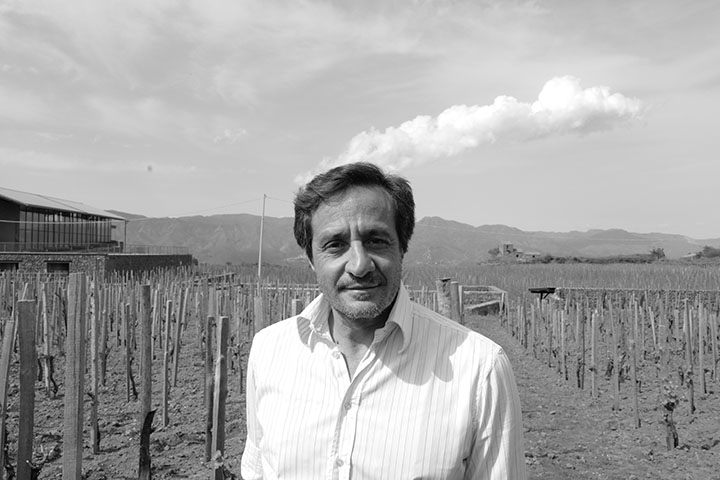 Mario Paoluzi is the owner of I Custodi, an artisanal winery located on the northern slope of Mt. Etna in Sicily. I Custodi refers to themselves as the "keepers" or the "guardians" of Mt. Etna's vineyards. Their mission is to preserve the land and traditions of the region as well as to respect the people.
Mario Paoluzi is the owner of I Custodi, an artisanal winery located on the northern slope of Mt. Etna in Sicily. I Custodi refers to themselves as the "keepers" or the "guardians" of Mt. Etna's vineyards. Their mission is to preserve the land and traditions of the region as well as to respect the people.
Paoluzi teamed up with well-known and highly regarded oenologist Salvo Foti to produce wines from Etna's indigenous grapes using traditional methods dating back centuries. The winery is part of a very important association of Sicilian growers and producers called "I Vigneri," which dates back 500 years but has more recently been revived by Foti as a way to pass on the skills and techniques of grape growing and winemaking from older generations. As a result, previously abandoned vineyards have been revived and there has been a renewed interest in the wines of Etna.
Christopher Barnes: Mario, tell us a little bit about how you got into the wine business.
Mario Paoluzi: It was 2007. I was already here in Sicily, in Catania since 2001, since I moved here from Rome for a family business reason. And I had the chance to meet with Salvo Foti, who was following at the time a project called Il Cantante that was owned by Mick Hucknall, the front man of a British music group called Simply Red. And they were actually looking for a partner but I was already living here in Catania. I was already knowing Etna.
And actually, I had the chance to meet with Salvo. And I was touched by his sensibility and his view. And I liked it. And I felt his way of sharing wine, and not just making wine, but actually feeling the territory. By the way, at the time, instead of joining the project of Il Cantante, I started my own project from the vineyard where we are now. Also because I think that wine is something so personal it's not really possible to share with anyone else.
Mario, tell us about I Vigneri. What is I Vigneri?
I Vigneri is something that Salvo Foti started in 2001, and it's a very nice and deep project, which regards not just the viticulture and the wine in general, but it goes deeper into the culture and to the nature of this great place, such as is Etna. I Vigneri, even if you ask Salvo Foti who has his own winery called I Vigneri "What is I Vigneri?" he would never answer you, "I Vigneri is my wine."
I Vigneri is a group of people who are taking care of our vineyards. And actually, it's a project that was collected in the idea from a labor union that was founded in 1435 in Catania, that was made to teach people how to cultivate the vines on Etna and to make the wine. So this is what Salvo is trying to do. So I Vigneri is a group of people which is actually composed of old-skilled people together with young guys from the area, all from the area, that are learning this job and taking care of the vineyards. So they're learning how to take care of our alberello vines and how to make wine.
This is something that is very important. And the I Vigneri project is fundamental for us that are cultivating the alberello because cultivating alberello is not just a question of money, but it's much more linked to a question of human resources and skills. Pruning an alberello, it's not something you can easily teach, especially if the alberello is old. You need time, you need skills, you need education. You need to read an alberello when it's old, and to understand where to prune, where to cut and where to leave. So this is the main issue, and this is what Salvo started in 2001, and what I Custodi is doing with Salvo.
There's a generation of people with these unique skills that are getting older. And there was, I guess, a generational gap of the next level of people who had these skills.
Yes. Wine on Etna has been made for dozens of centuries. First the Greeks, and then the Romans developed the viticulture here. And actually, the viticulture was very strong and very well developed until the last century. But also, people here were so linked to the soil and to the land. And a lot of old people still are and were working in the vineyards. There is actually an intermediate generation that was lost because a lot of people in the last decades were just leaving this place and work, and there were a lot of vineyards abandoned.
So we are trying, especially with the very young generation, to innovate this culture and to make these vineyards live again. And I think that we are getting pretty successful, because even if until a few years ago, nobody would think about coming and working in agriculture. Now there is a generation who is willing to take care of the vineyards, are getting skilled doing it, and I hope that this will continue and that we will be able to pass on even to the next generations.
And let's talk a little bit about Salvo Foti. How would you describe his importance to the region?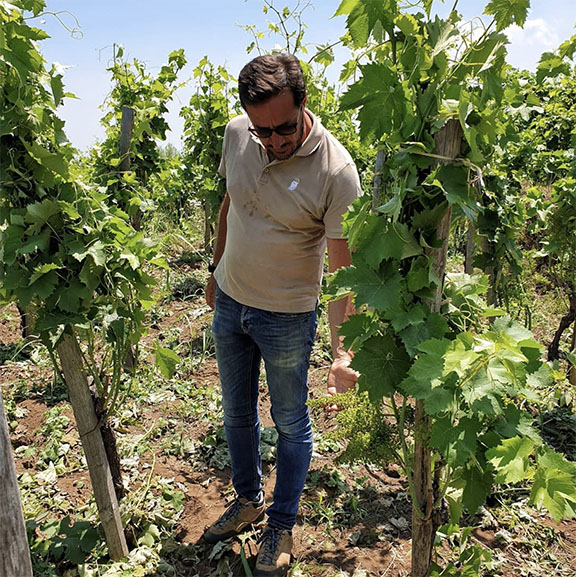 To me, Salvo Foti is a very important part of Etna, probably together with Benanti. Together with Benanti, to me, they made Etna, because the first wine of Benanti made by Salvo Foti, was actually the wine that first made Etna known internationally, and actually opened up the curiosity of this terroir, and made so many people come here and invest. So for sure, he was the one who with Benanti started Etna.
To me, Salvo Foti is a very important part of Etna, probably together with Benanti. Together with Benanti, to me, they made Etna, because the first wine of Benanti made by Salvo Foti, was actually the wine that first made Etna known internationally, and actually opened up the curiosity of this terroir, and made so many people come here and invest. So for sure, he was the one who with Benanti started Etna.
As a winemaker, he is the one who has probably the longest knowledge of Etna since his first vintage goes back to the late eighties. I share with Salvo the same vision, which is actually, it's not only a question of wine but wine is mostly a question of humanity. So to make a good wine, first of all of course, you absolutely need a good grape. You can do anything now with technology, you can do whatever you want in the cellar with any grape, but it won't be a human wine.
Human wine means respect for the people who are working in the vineyard, for the people as well who are drinking the wine. By the way, we are what we drink. So if everything is done in the right way starting with the cultivation, avoiding using products which are not good for our health, and then if we keep being able to work safely and nicely and clean in the cellar, then we have respect for the people working in the vineyards and the cellar, and we are able to drink wines that are fully respectful of ourselves.
For me, one of the things that I find really compelling about I Vigneri is there's almost a spiritual part of it. There's almost an emotional connection to the land, which is part of this whole philosophy, that's part of the fact that you're making wine in a very special place.
For sure on Etna, we are in a very special place, in a place that attracts in a very particular way. I'm from Rome, and as I came here, I felt so attracted to Etna that actually, I couldn't leave anymore. And this is something I think, that is not actually very personal to me, but it's something very common because a lot of people arrived here on Etna or in Western Sicily and then they got stuck. So there is something in the land, in the soil, in the volcano that keeps you linked to here. For us also, there is also the alberello. Alberello is something that really inspires us in the way of making the right way, in the good way, as always has been done, and also inspires us in our wines.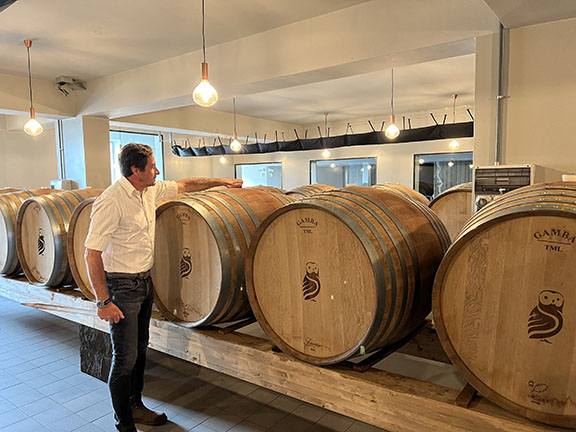 And let's talk a little bit about the palmento, and the fact that there's this very traditional way of making wine and the EU came in and said, "You can't do it for sanitary reasons." And there's a movement to bring the palmento back.
And let's talk a little bit about the palmento, and the fact that there's this very traditional way of making wine and the EU came in and said, "You can't do it for sanitary reasons." And there's a movement to bring the palmento back.
Etna has passed within the last two millenniums, it passed very high periods, as well, very low periods. It was a very popular area for wine with the Greeks and the Romans. And it was probably the biggest area of production of wine between the end of the 19th century and the beginning of the 20th century when they were producing on Etna around 40 million liters of wine. Right now, we are producing three to four. So it was huge. It was 10 times what we produce now. And as well, there were very, very sad moments. One of the saddest, probably the lowest moments that Etna touched, was really in the eighties, in the same period when Salvo Foti and Benanti restarted Etna.
And this was the period when the European community didn't allow us to use the palmento anymore. Here, every single vineyard had its own palmento and these palmentos were sized for the vineyard. The palmento, it was the facility, it was the cellar where we used to make wine , and it was used to do, of course, in concrete or stone. And it was pressed with a traditional press, with a very big wood and a weight. And everyone was making wine for their own consumption.
But in the eighties, due also to some other scandals, this was not allowed anymore. And this actually, since there weren't any facilities here to make wine, just made the vineyards get abandoned. So in the eighties, in the early nineties, you could purchase a vineyard just by paying the notary act, because managing a vineyard was much more expensive than anything you can get from it. So people were just leaving their vineyards because they had no way to take care for fines. And this really was very sad because actually it was unreasonable, because on Etna, we have been doing vinifying wine in palmento for over 2,000 years and nobody has died from the wine from the palmento.
And so, it was meaningless. Anyway, what is good is that there is a movement that wants to take back this tradition. Already Salvo (Foti) does wine in palmento. At I Custodi, I will renovate my palmento at the cellar and I will do my palmento wine in the cellar from the next vintage. And this is, I think, important. It's absolutely necessary because this is a tradition that we should never ever lose.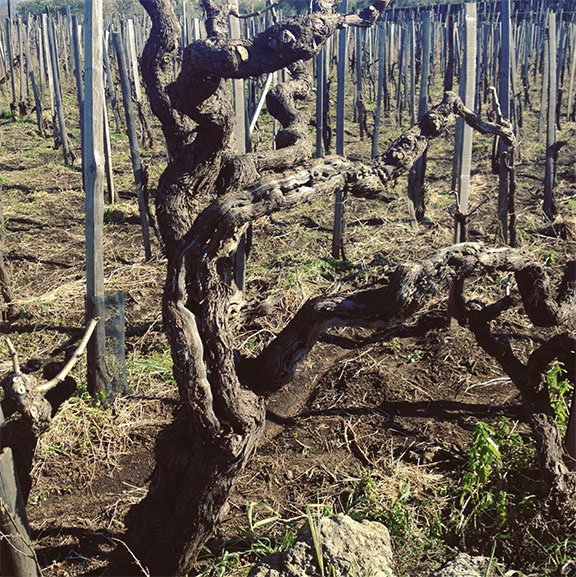 And talk a little bit about the terroir here and the impact of the volcano on the wine.
And talk a little bit about the terroir here and the impact of the volcano on the wine.
Talking about the wine, we are really on a great terroir. We have this huge volcano that really gives us a lot of things. First of all, I can talk about its shape. It's a volcano. So it's a round mountain, and you can have cultivation all over, around, and one side of the volcano is just next to the sea. So you have a very different microclimate, considering the slopes. Then, of course, since it's a mountain, you also have elevation differences, and being such a low latitude, we have some great microclimates for wines.
We are here in the northern slopes of Etna, which are considered probably the best for the cultivation of Nerello Mascalese and Nerello Cappuccio, for the red wine. And on the other side, we have the eastern slopes right on the sea, which get the influence of the sea and the mountain. And it gets much more cloudy, rainy, and chilly weather which is very good for the Carricante grapes.
So it's a place that can give in a very small area, great whites and great reds with incredibly different characteristics, such as here in the north, we have about four to five times less rain than on the other side on the east. And as well, we have the ashes of Etna that make the soil so incredibly rich of minerals and so fertile. So it's an incredible, fertile terroir with a good balance of water and sun and moderate climate.
Can you talk a little bit about the volcano itself and the activity and how active it is? How is it living around something, which in some sense gives you so much, and in another sense, has its own challenges?
Living on the volcano, it's something very, very strong. There is some energy that the volcano gives to you. It's something that is not really technically or scientifically easy to explain. Any one of us, we aren't really afraid of the volcano. All the people just feel a very strong love attachment for the volcano, not really a fear of the volcano. So personally, of course, living on the volcano gives you sometimes some limitations, but I believe that the advantages are much stronger than the disadvantages. The only real disadvantage we have, last year, yes, we had around 70 eruptions from February to December, and about half of these times it erupted strongly, putting out ashes. The only contraindication you have from this is that unfortunately if the wind is blowing on your side, that you will have to clean your terrace.
Mario, talk a little bit about the different cultures that have helped to create what is modern Etna and modern Sicily.
Yes, Sicily, since more than 2,400 years ago, has been dominated by several different cultures. Before the Phoenicians, the Greeks, then the Romans, then the Arabs, the Normans, the French, the Spanish, the English. So all these cultures have left something to Sicily and enriched Sicily. I can tell you that as a Roman, I arrived here over 20 years ago and I was always feeling very welcome in Sicily. And I feel a land rich in culture. All these cultures have added something to the land, to the culture, to the terroir. I think that this reflects in everything. It is reflected in the art we can find all over Sicily, especially in the food, in the richness of the food and the dishes of Sicily, which gets contributions from the Greeks, the Romans, the Arabs, and then as well the French and the Spanish. And this as well, of course, in the wine. 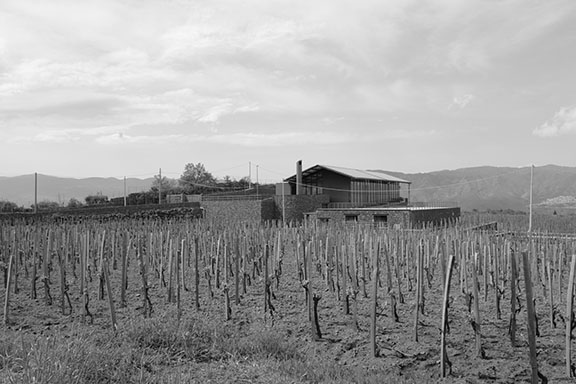 Talk a little bit about how the modern wine community in Etna somehow reflects this multiculturalism.
Talk a little bit about how the modern wine community in Etna somehow reflects this multiculturalism.
As well now, we have a lot of people coming from abroad besides the local ones, that have given their contributions to the development of Etna. We have people from very far, from China, Japan. We have people from Belgium, many people also from Italy, from Piedmont, and I think that all these people have brought something to Etna in the way of making wine, and also in the way of communicating the wine and making the wine seen all over the world. And I think that this is a richness that also was very well accepted by the people of Etna. It's a richness that also made the growth of Etna so fast.
There's a quote from Salvo Foti in one of the books that I've read, which is, "There are people that make Etna wine, and there are people that make wine on Etna." I just read that a large conglomerate was bought on Etna two weeks ago. Do you have concerns that the community here is going to get diluted as more of these big companies come in?
There are some very big companies, especially from western Sicily, that bought on Etna. I think that Etna is still a very small territory and it's still not at a critical size to be known worldwide. So there is space to grow. I think that the more people that come, the better it is. What I think as well, that is very important, is the respect of the territory.
I think that it will be very important, very critical, the role of the consortium within the next year to manage the control of every new project, any new investment that will be done here on Etna, and that it will be done to increase the overall quality of the wines and to grow the name and the wines of Etna. So it is very important that the consortium will protect us from speculations because we are sitting on such a great richness, and I think that nobody has any interest to destroy it or to damage it.
And maybe just a word on where you see the future of Etna, like what you see happening next.
On Etna, what I see now is that I see the overall quality of the wines getting better every year. And also, there is more homogeneity of the wines and the way that we are doing this. I think that we are all working in a good way and we shouldn't ever lose this spirit ever. However, I believe that Etna will become better with time, stronger, but will especially keep this quality at the same very high level.
One thing that I've noticed about Etna is that, unlike some other wine regions, say Piedmont or Napa, is there is a lot of diversity in the land, in the fact that there's not just vines, but you have areas with lemons and oranges and pistachios, and that there's a real sense that this is an agricultural area, not just a wine area.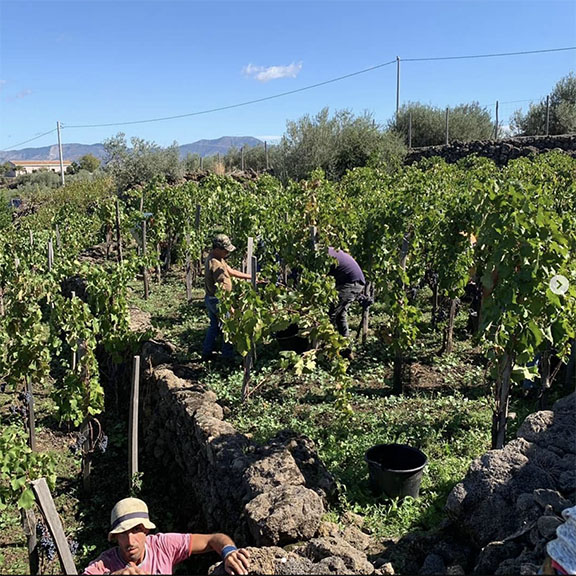 Yes. Etna is an incredible place, because in Etna, you can find almost tropical cultivation. There is a very nice cultivation of mangos, avocados. Cultivation such as apples as well. Of course, wine and oil. And I think that this biodiversity is one of the most important riches of Etna, and this is something that absolutely should be preserved. Etna, it's not just wine. It's I think much more than just wine and grapes, it's more, which is linked to the territory, to this incredibly fertile soil, to this very various weather, but more importantly, I think, to this culture.
Yes. Etna is an incredible place, because in Etna, you can find almost tropical cultivation. There is a very nice cultivation of mangos, avocados. Cultivation such as apples as well. Of course, wine and oil. And I think that this biodiversity is one of the most important riches of Etna, and this is something that absolutely should be preserved. Etna, it's not just wine. It's I think much more than just wine and grapes, it's more, which is linked to the territory, to this incredibly fertile soil, to this very various weather, but more importantly, I think, to this culture.
How do you see Nerello Mascalese and Carricante in terms of wines that evolve?
First of all, concerning the grapes of Etna, we have two major grapes, Nerello Mascalese and Carricante, but as well, we have Nerello Cappuccio. Nerello Mascalese is probably the most important grape of Etna, with its characteristic elegance. But I think that with an Etna Rosso, it is also always important the presence of Nerello Cappuccio, which complements the Nerello Mascalese. It is the part that actually the Mascalese is a little bit lacking. And so, I think that, first of all, Etna Rosso, it is important that it is always planted with a little part of Cappuccio.
Second thing, I think that we are very lucky because it's one of the very few places in the world where we can have red grapes and red wines and white wines, such as the Etna Bianco with the Carricante. Carricante, I think that has probably the potential of aging, to me, even more than Nerello Mascalese. Yesterday, I had the chance to open a very beautiful bottle from an Etna producer from 2010. Actually, it seemed that it was just bottled last month, not even last year. So Carricante I think has this great potential of aging and being so nice and complex. So we have the chance to really have two, three great grapes.
Editors note: A special thank you to the Vinitaly International Academy, as some of the content in the embedded video was taken during an October 2021 Vinitaly International Academy trip to Mount Etna.














